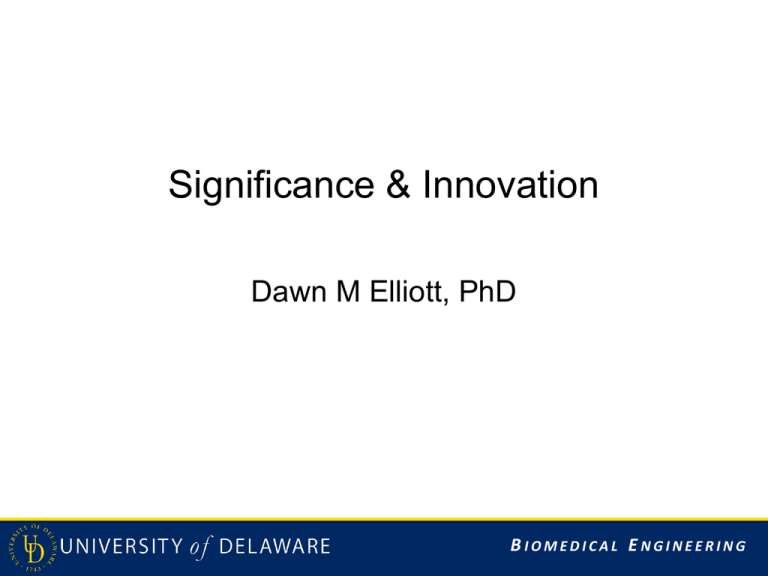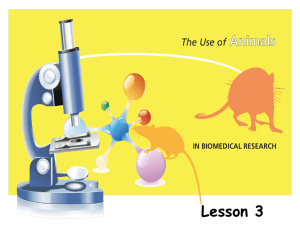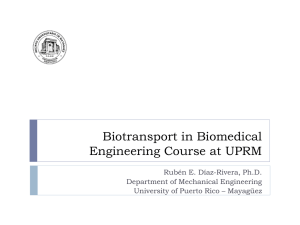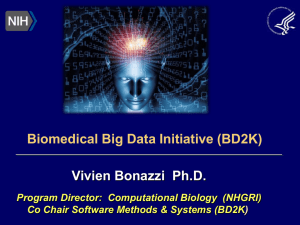Innovation & Significance
advertisement

Significance & Innovation Dawn M Elliott, PhD BIOMEDICAL ENGINEERING Research Plan • Significance + Innovation + Approach (Study Design) R01 = 12 Pages R21 = 6 Pages Review Criteria • Overall Impact (overall score) • Scored Review Criteria Significance Investigator Innovation Approach Environment BIOMEDICAL ENGINEERING Dawn’s advice: • In Specific Aims – in the final paragraph Explicitly address Overall Impact • In Aims or Research Plan explicitly state: “This study is significant because….” “This study in innovative because….” • Why make the reviewer figure it out, when you can just tell them? BIOMEDICAL ENGINEERING Significance BIOMEDICAL ENGINEERING Significance (NIH Directions) • Explain the importance of the problem or critical barrier to progress in the field that the proposed project addresses • Explain how the proposed project will improve scientific knowledge, technical capability, and/or clinical practice in one or more broad fields • Describe how the concepts, methods, technologies, treatments, services or preventative interventions that drive this field will be changed if the proposed aims are achieved B I O M E D I C5A L E N G I N E E R I N G Writing the Significance Section • Suggested length 1-2 page • Identify research problem that you propose to address Explain importance of resolving problem • link to mission of NIH institute & public health aspects Briefly identify most important, relevant studies of other researchers – and identify important questions that have not yet been addressed Specify how your study will differ from previous work; how it will contribute to scientific knowledge/clinical practice Address anticipated impact of your research • on your field • on public health B I O M E D I C6A L E N G I N E E R I N G Writing Significance • The Significance section is where you begin to increase the level of detail that will extend and validate what was written in the Specific Aims section • Provide a critical analysis of the primary literature that describes the existence of a critical gap in knowledge Explain why its continued existence represents an important problem that must be resolved BIOMEDICAL ENGINEERING Significance Structure • Organization Short summary of objective of study • “This proposal will investigate…” Multiple sections for key points • Clinical significance • Basic science significance • Each section and background material should directly and explicitly tie into your proposal (final sentence of each section) “Arguably the costs and lost quality of life due to degeneration is a national epidemic” “A central unresolved question is whether…” “Our proposal will quantify….” BIOMEDICAL ENGINEERING Be Straightforward – and Current • Does this study address an important problem? “This research question was identified as a major research focus (cite NIH program announcement or other source)” • If the aims of the application are achieved, how will scientific knowledge be advanced? “Our knowledge of . . . will be advanced by . . .” • What will be the impact of these studies on the concepts or methods that drive this field? • How will your studies speed advances, hasten translation? • Keep in mind NIH focus on public health: identify how your research will improve public health B I O M E D I C9A L E N G I N E E R I N G Dawn’s advice: • Use images to break up the page and make points • Make sure they are readable! • Don’t use too many abbreviations and include a list • Use formatting to your advantage BIOMEDICAL ENGINEERING Significance ≠ Illness • Don’t argue that a particular illness is significant • Significance: What will you do to help cure the illness/lessen its consequences/prevent sequelae? B I O M 11 EDICAL ENGINEERING Writing Significance • Describe the positive impact your contribution will have How will your contribution enable subsequent thinking and research? Call attention to decreased mortality/morbidity, improvements in the quality of life, medical outcomes, reduction in cost of medical care BIOMEDICAL ENGINEERING Innovation BIOMEDICAL ENGINEERING Innovation (NIH Directions) • Explain how the application challenges and seeks to shift current research or clinical practice paradigms • Describe any novel theoretical concepts, approaches or methodologies, instrumentation or interventions to be developed or used, and any advantage over existing methodologies, instrumentation or interventions • Explain any refinements, improvements, or new applications of theoretical concepts, approaches or methodologies, instrumentation or interventions BIOMEDICAL ENGINEERING Think Broadly about Innovation • New mechanistic hypothesis • New combination of expertise (unusual multidisciplinary team) leading to new perspective • New combination of 2 previously used methods • Refinement of existing model or technology • Unique sample or opportunity provide the novelty B I O M E D I C15 AL ENGINEERING Writing Innovation • Suggested length ½ - 1 page • Does your research incorporate a new perspective on your subject? • Does the proposed research employ novel concepts, approaches or methods? “The proposed research employs a novel method that we developed . . .” • Are the aims original and innovative? “These aims are original in that . . . While they build on . . . , they are designed to advance our understanding of . . .” • Does the project challenge existing paradigms or develop new methodologies or technologies? B I O M E D I C16 AL ENGINEERING Example from my (funded) grant • 1/3 page • Bulleted list BIOMEDICAL ENGINEERING Another example from (funded) grant • 1st paragraph of 1 page Innovation section: The studies we propose will capitalize on innovative state-of-the-art technology in high-resolution microMRI, image registration, and computational modeling to quantify and evaluate internal disc stress and strain fields with unmatched capability. …Our proposal, which integrates experiments and modeling, where both approaches inform each other, is a powerful and distinctive approach. Simultaneous development of both experimental and modeling techniques to quantify disc internal stressstrain fields noninvasively, especially at tears, provides capabilities not previously achieved. BIOMEDICAL ENGINEERING Make Sure Your Research Question is Unique • Search NIH Research Portfolio Online Reporting Tool Expenditures and Results (RePORTER) database to see if anyone else has been funded to carry out similar research • http://report.nih.gov B I O M E D I C19 AL ENGINEERING Innovation is Necessary, But Not Justification “This model has been tested in rabbits, mice, rats, drosophila, dogs, cats, chickens, zebrafish and hamsters, but no one has looked at it in a frog yet.” B I O M E D I C20 AL ENGINEERING But… “This model has been tested in rabbits, mice, rats, drosophila, dogs, cats, chickens, zebrafish and hamsters, but no one has looked at it in humans or better yet patients with the condition of interest.” …. is a different story B I O M 21 EDICAL ENGINEERING Writing Innovation • Describe the positive impact that will result from your innovative approach Positive impact under Significance stems from concrete benefit that is relevant to NIH’s mission Positive impact under Innovation stems from advancement that would have been unlikely without substantive – not incremental – departure from the status quo BIOMEDICAL ENGINEERING Too Much Innovation • Be careful about arguing you’re “outside the mainstream” • Need to balance innovation with: Feasibility (preliminary data, scope of research) Credibility (training, publications) B I O M E D I C23 AL ENGINEERING Final Thoughts • Grant writing is different from other technical writing • Read by only a few people Tired and fitting this service into busy schedules But get excited by good ideas presented well • Persuasive writing – tell a story and draw the reviewer in • Win their interest in going to bat for your proposal, do not beat them into submission BIOMEDICAL ENGINEERING








